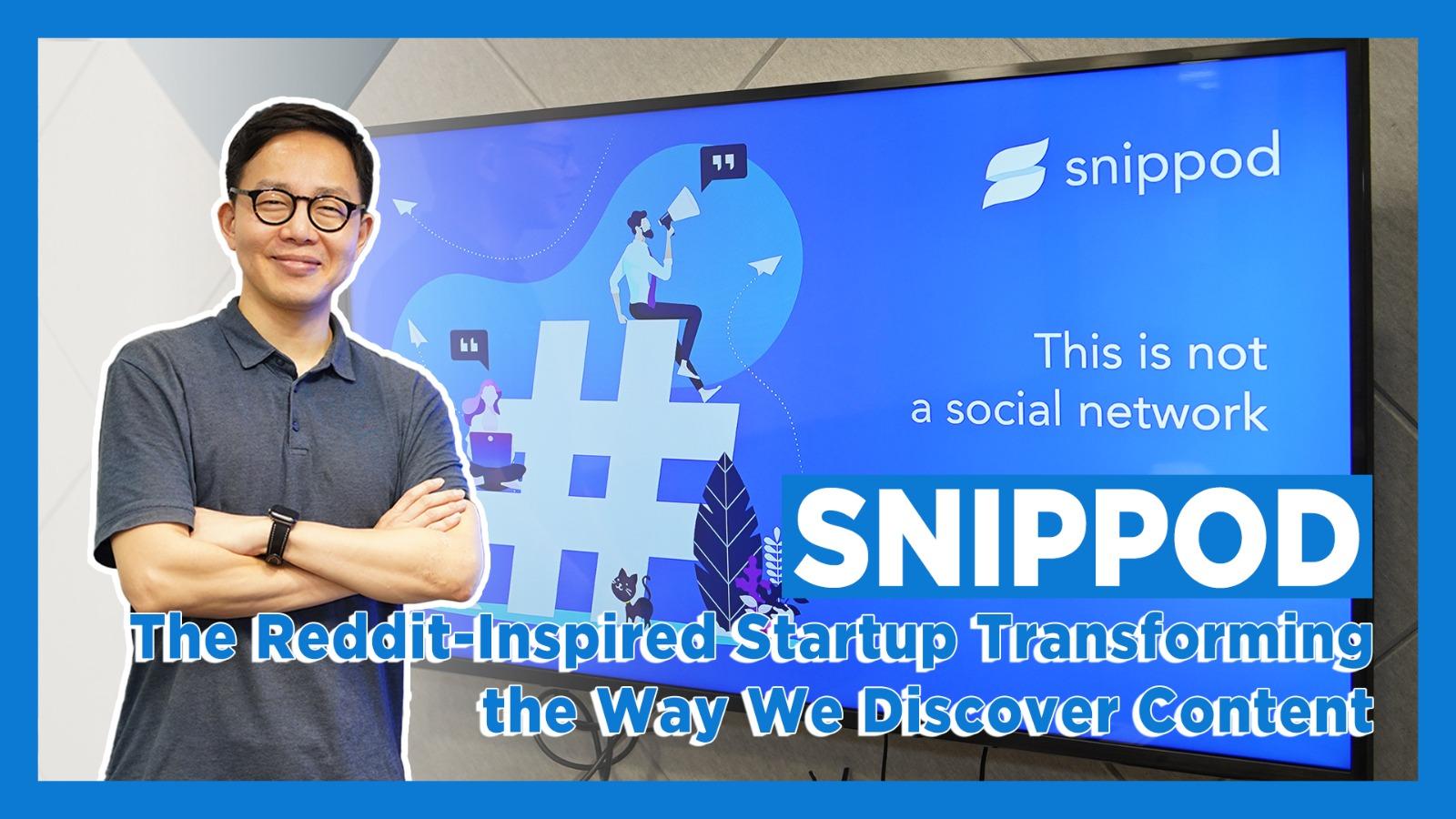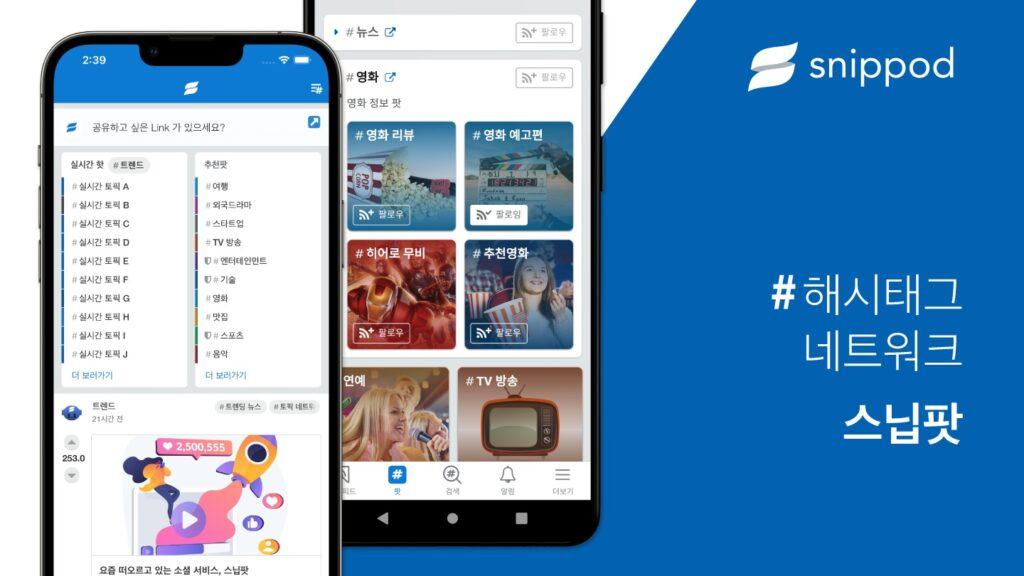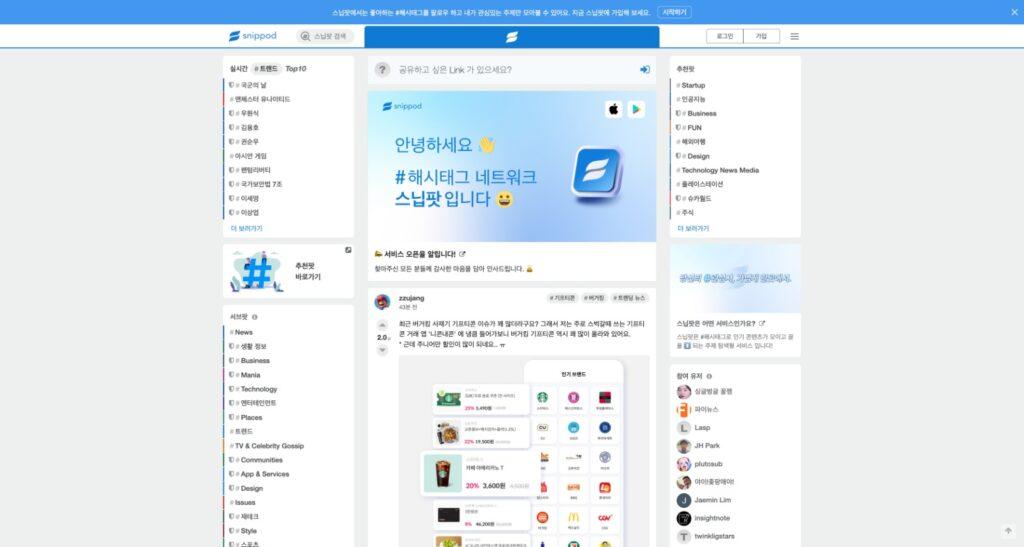AsiaTechDaily – Asia's Leading Tech and Startup Media Platform

The Reddit-Inspired Startup Transforming the Way We Discover Content – An Interview with Lee Sung-gyu, CEO of Snippod
The search market is changing. When you type in a single word, you get a huge amount of data in various forms, such as dictionary definitions, videos, and blogs. Today, however, services that simplify search results and provide customized information that users actually want are growing rapidly.
Even in Korea, the market share of search services is shifting from Naver and Daum to Instagram, TikTok, and YouTube, and many platforms are incorporating AI technology to increase their search market share. Google’s “Bard” and Microsoft’s “Bing” offer AI chat services, and Naver is also preparing its next-generation search service, “Search GPT.
In response to these changes, Snippod entered the market in August 2023 as a new search service that collects and displays popular links using hashtags. We met with Snippod CEO Lee Sung-gyu, who developed this new information platform called Snippod.
Q. Please tell us why you started your company.
I have long thought that the most important field in Internet services is search engine. So I wanted to do research on Internet search, so I studied in that field in graduate school.
Web search is often said to be a query for information, which means that when you ask a question, the answer comes out. I used to think that getting better information was a better thing, but now we are aggregating information that people are interested in and providing it all at the same time. I thought there were limitations to existing search services and that there should be a better service on the market, so I invented Snippod.

Snippod provides users with a search service by topic.
Q. What is the difference between existing search services and Snippod?
When you search for a specific word on a website such as Google or Naver, you can select and view the content you want, such as news, blogs, images, etc., but these categories are limited. But these categories are limited. This is because they only show information related to the searched ‘keyword’, even within the category you select.
Keywords or content that are popular today will not appear at the top. For example, if a famous soccer player, Son Heung-min, has become a popular keyword these days, users may search for Son Heung-min. And they will want to see a video of Son Heung-min scoring a hat-trick in yesterday’s Premier League match as the top result. However, on most websites, Son Heung-min’s personal information appears at the top, and articles that have been popular in the past appear next.
So Snippod focuses on “topics” rather than keywords and shows users the content they want to see most, providing information in a different form than others.
Q. Can you tell us the main features of the Snippod service?
One unique feature of the Snippod service is that the hashtags are all related.
For example, if you are interested in travel, under the topic of travel, you will find categories divided by country or city, such as travel to the United States, travel to London, travel to Osaka, and so on.
When you become interested in a topic, you often want to learn more about it. Snippod reflects this flow of thought by suggesting information and allowing users to easily get the information they want.
Snippod provides services by unifying the methods of searching and obtaining information. Therefore, instead of letting users collect and organize individual pieces of information themselves, as existing search services do, we help users obtain more comprehensive information.

Snippod, a Korean-style Reddit, has emerged as a new search service.
Q. Are there any services similar to Snippod domestically or internationally?
The closest service is Reddit in the United States. Reddit currently uses the concept of subreddits, so that content posted by people related to each topic of interest is exposed, and through a ranking system, content preferred by people is upvoted, placed on top, and exposed for a long time. We have referenced the algorithms of this Reddit service.
The algorithm was referenced, but unlike Reddit, once popular content is determined by user consensus, Snippod provides information purely based on whether the information on the topic is accurate. So our service helps users get the information they want, not just communicate with others on a particular topic.
Q. In addition to search services, we also search popular content on social media. How is Snippod different from other social media sites?
When it comes to topic search, people want to quickly catch up on popular content for any topic they are interested in and then do other things. But it seems that social media algorithms expose users to too much content unnecessarily.
In addition, social media sites require the collection of personal information in order to serve advertisements to users. The collection of such personal information requires user consent and cannot be collected arbitrarily, which limits advertising. On the other hand, Snippod basically uses a topic as a medium and only shows content related to that specific topic, so there is no need to collect users’ personal information.
For example, if you are interested in artificial intelligence and try to get information about ChatGPT on Snippod, only relevant ads will be displayed. So there is no need for us to collect personal information about users’ interests or Internet usage patterns. However, since the information searched for can be verified, related products can be displayed as ads that are customized for each user.

Q. What is the difference between Snippod’s real-time search trends feature and Naver’s real-time keyword rankings?
The method of extracting popular search terms in real time is the same for both Naver and Snippod. However, previously, when you clicked on a keyword, only the search results for that word appeared, so it was not easy for users to know why that keyword was currently popular.
On Snippod, each keyword serves as a topic, so when you click on a keyword in the list, all the news articles, videos, and blogs that are trending today on that topic are displayed, so users can quickly find out why that keyword is trending.
Q. Please tell us why you started your business in Pangyo.
Just being able to interact with the CEOs of other startup companies in their early stages of business helped me a lot mentally in Pangyo. Even though these people were doing business in all different fields, they gave me a lot of information that I could use as a reference.
Also, because there are large companies that provide information search services, such as Naver and Kakao, I had many opportunities to meet people who worked for these companies. And my classmates from graduate school also work in Pangyo, which is helpful in many ways. It was very helpful to be able to read trends while hearing what the search market is like these days and what the concerns and plans of these big companies are.
He advises not to be afraid of starting a business and to learn by doing.
Q. You worked for a company and then started your own business. Do you have any advice for budding entrepreneurs?
Working in a large company was helpful, but I regret not starting my own business much sooner.
While I was working at a company, I was building a network and securing the funding I needed for my business. But I think the most effective way to do business is to start right away and learn as you go.
It is better to try to start a business on your own than to try to gain experience that can help you start a business by working for a company. So if you think you have a brilliant idea, I think you can start right away.
Q. Please tell us about the ultimate goal of Snippod.
Nowadays, it has become common to get information through various channels such as search portals, social media or communities, but users do not seem to bother to try other ways to get information.
Our goal is to help users get new types of information through our Snippod and create a new paradigm in the search service market.
For inquiries and connections with Korean tech companies mentioned in this article,, contact us at [email protected]. We’re here to facilitate valuable partnerships.
Also Read,
- CEO Jung Hae-hyun of Newjak is to promote K-culture in the global market with XR content
- Leading the Global Beauty Industry with Smart Mirror Technology: An Interview with Jejung Yu, Vice President of ‘Mirrorroid’
- AI-Powered Safety Systems: Exclusive Interview with Hwang Yeong-kyu, CEO of Alchera
- Fassker CEO on Revolutionizing Fashion through Digital Innovation & Metaverse Technology





